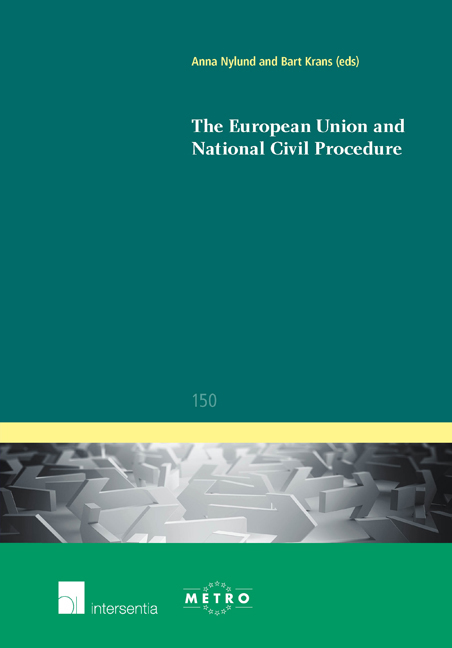Book contents
- Frontmatter
- Contents
- About the Authors
- List of Abbreviations
- The European Union and National Civil Procedure – A Rocky Road or a Smooth Process?
- Some European Challenges for Belgian Civil Procedure
- Danish Civil Procedure and the Internal Market: Impact and Challenges of Sectoral Harmonisation
- European Influences upon English Civil Justice: Tempests or Gentle Breezes?
- European Union and National Civil Procedure: The French Paradox
- The European Union and Civil Procedure from a German Perspective
- Interaction between European Law and Hungarian Civil Procedure Law
- The Impact of EU Law on Dutch Civil Procedure Law
- Norway: An Insider Outside – or an Outsider Inside – European Civil Justice
- Polish Civil Proceedings: How Much Europeanised?
- Slovenian Civil Procedure and the Transformative Power of the EU
- The Curious Incident of the Dog in the Night-Time: Europeanisation of Civil Procedure in Sweden
- Conclusions and Outlook
- Index
- Miscellaneous Endmatter
Conclusions and Outlook
Published online by Cambridge University Press: 19 December 2017
- Frontmatter
- Contents
- About the Authors
- List of Abbreviations
- The European Union and National Civil Procedure – A Rocky Road or a Smooth Process?
- Some European Challenges for Belgian Civil Procedure
- Danish Civil Procedure and the Internal Market: Impact and Challenges of Sectoral Harmonisation
- European Influences upon English Civil Justice: Tempests or Gentle Breezes?
- European Union and National Civil Procedure: The French Paradox
- The European Union and Civil Procedure from a German Perspective
- Interaction between European Law and Hungarian Civil Procedure Law
- The Impact of EU Law on Dutch Civil Procedure Law
- Norway: An Insider Outside – or an Outsider Inside – European Civil Justice
- Polish Civil Proceedings: How Much Europeanised?
- Slovenian Civil Procedure and the Transformative Power of the EU
- The Curious Incident of the Dog in the Night-Time: Europeanisation of Civil Procedure in Sweden
- Conclusions and Outlook
- Index
- Miscellaneous Endmatter
Summary
Impact, in Various Ways
The first and clear conclusion from the papers in this book is far from surprising: law of the European Union has impact on national civil procedure. This might concern primary EU law, secondary EU law, case law, fundamental legal principles or soft law instruments. At the same time, there seems to be significant variation on several aspects of the impact of EU law on national civil procedure law. It appears that there is variation in the level of influence and in the way EU law has impact on national procedural systems. The various countries display considerable variation as to the extent of the influence both in terms of width and depth of the impact. In some countries, many different areas of civil procedure have undergone some change, while in others change is more limited in scope, or on certain areas even absent. Some national civil procedure systems have faced profound impact in some areas. While change in other systems has, at least so far, been limited to a much lower level of just concerns peripheral areas. In some of the countries studied, Europeanisation of EU law has met more resistance than in others. In this concluding chapter, we go into some general conclusions by analysing and comparing the various contributions.
All of the papers are of course limited in length and scope. The particular viewpoint of contributors may perhaps be of influence on the various contributions. The scope of the book does not allow for a full picture of each of the countries. Within the boundaries of the limited scope of the findings of the various papers, some general conclusions and observations can be made.
General Conclusions from the Papers
a. Variety in impact. The first conclusion, already stated, is clear and not unexpected: the impact of varies by Member State. In section 4 of this chapter, we will go into this.
b. Diminishing procedural autonomy. As a starting point, national civil procedure law is up to the Member States. It follows from the procedural autonomy that, in absence of EU law Member States are free to construct there procedural system as they deem fit.
- Type
- Chapter
- Information
- The European Union and National Civil Procedure , pp. 161 - 170Publisher: IntersentiaPrint publication year: 2016



